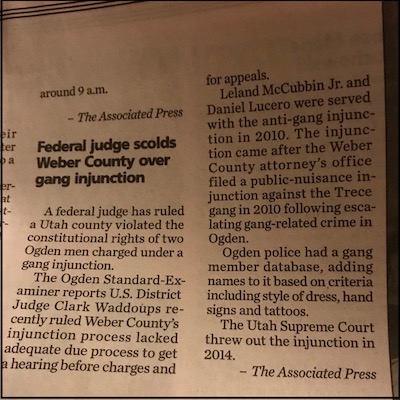Class action petition filed requesting that all convictions of individuals charged with violating the Ogden gang injunction be vacated.
For Immediate Release
October 28, 2014
Today, the ACLU of Utah, along with cooperating attorney Randall Richards of Richards & Brown, P.C., filed a class action petition under Utah’s Post Conviction Remedies Act, requesting that the state court vacate all convictions of individuals charged with violating the so-called Ogden gang injunction in light of the Utah Supreme Court’s decision last year dissolving that injunction.
The Ogden gang injunction was issued by the court presiding over a 2010 lawsuit in which Weber County sued the Ogden Trece gang, claiming that the gang was a public nuisance. The court agreed with Weber County and issued a preliminary injunction, later made permanent, against the gang. The injunction placed various restrictions on the constitutionally protected activities of people served with it. For example, the injunction established an 11 pm curfew and disallowed people from being seen in public with other alleged gang members, even family members. The injunction applied to such activities in virtually the entire city of Ogden. The injunction had no requirement that law enforcement officials needed to prove that an individual being served with the injunction was a actually member of the gang. Instead, the injunction was immediately effective on anyone served with it, and then that person had to go to court to disprove that he or she was a member.
On October 18, 2013, the Utah Supreme Court vacated the Ogden Gang injunction. The Court ruled that because the Ogden Trece gang was an unincorporated association, Weber County should have followed Utah rules to serve the gang with the process that initiated the lawsuit. Weber County did not follow those rules, however, which meant service was improper. Because this initial service was flawed, the court had no power to bind the gang in legal proceedings, as it did not have a fair opportunity to be heard. Accordingly, the Supreme Court dissolved the injunction.
During the time before that ruling, however, people served with the injunction were charged and convicted of violating the terms of the Injunction, including violations of the curfew. Such violations were class B misdemeanors, which carry penalties of up to 6 months in jail and a $500 fine. While it is not presently known how many people were convicted of such violations, it is believed to be at least 50 people. Lead plaintiff Daniel Lucero was one such person convicted of violating the Injunction’s curfew provision.
The petition filed today asserts that because the district court had no power to issue the gang injunction in the first instance, it violates the constitution to allow any conviction for violating that injunction to stand. The petition also contends that because the injunction allowed law enforcement to deprive people of rights by simply serving them with the injunction, people cannot be properly punished for violating the injunction.
“Under our federal and state constitutions, courts may only issue binding orders when they have properly established jurisdiction over the parties,” said John Mejia, Legal Director of the ACLU of Utah. “In this case, the Utah Supreme Court has ruled that the district court lacked jurisdiction to issue the Ogden gang injunction. Since the court was without power to issue that order, no one can be lawfully punished for violating it,” he continued.
“We believe that many of the convictions of the gang injunction were for activities that were otherwise perfectly legal, like being out in Ogden after the injunction’s 11 pm curfew,” said Randall Richards. “It would be a grave injustice for people to have convictions on their records for simply exercising their constitutional rights,” he concluded.
For more information, please visit: https://www.acluutah.org/legal-work/current-cases/item/887-lucero-v-utah
Related Content

ACLU of Utah Plaintiffs Granted Major Victory in Weber County Gang Injunction Case
Stay Informed
Sign up to be the first to hear about how to take action.
By completing this form, I agree to receive occasional emails per the terms of the ACLU’s privacy statement.
By completing this form, I agree to receive occasional emails per the terms of the ACLU’s privacy statement.
